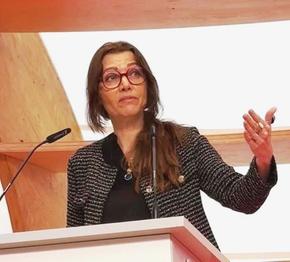 "It's a strange time to be alive. It's a very strange time to be a writer," said author Elif Shafak (There Are Rivers in the Sky; The Bastard of Istanbul), during the Frankfurt Book Fair's opening press conference yesterday.
"It's a strange time to be alive. It's a very strange time to be a writer," said author Elif Shafak (There Are Rivers in the Sky; The Bastard of Istanbul), during the Frankfurt Book Fair's opening press conference yesterday.
Shafak contrasted the current moment, one she called full of "tribalism, destruction, and othering," to the years after the fall of the Berlin Wall and collapse of the Soviet Union, when there was a "sentiment of optimism in the air." At the time, some of the most optimistic voices belonged to the tech industry, who "told us that through the proliferation of digital technology," people around the world would become informed citizens making informed decisions, and liberal democracy would inevitably "spread all across the globe."
She noted that while these optimistic voices claimed that history was linear, something that "could only move in one direction," storytellers knew better. "We never treat time like that. For us, time is more cyclical. And we know that time sometimes moves forwards, but sometimes it moves backwards."
 |
|
| Elif Shafak | |
Jumping back to the present, Shafak described a "troubled world" that "remains deeply polarized and bitterly politicized, and torn apart by inequality and wars, and the cruelty that we're capable of inflicting upon each other but also on Earth." At the same time, while there is more information at our fingertips than ever before, there is "little knowledge and even less wisdom."
Although "snippets of information rain on us every day," Shafak continued, filling our social media feeds, "we have no time to process." Hyper-information "gives us the illusion of knowledge," but real knowledge "cannot be rushed." At the same time, this deluge of information cannot help us build emotional intelligence or empathy. Amid such a state of affairs, Shafak wondered, "what can writers and poets even hope to achieve?"
For cultivating knowledge and wisdom, she said, for building empathy and emotional intelligence, "we need literature." Storytelling is something "universal and ancient" that "cannot be confined." It is "all about connections," and the literary mind "cannot be isolationist." "If we care about water scarcity," said Shafak, "we have to care about gender inequality. If we care about gender inequality, we have to care about racial inequality, and so on."
Writers of course "adore stories," but Shafak said she believes they are as "equally drawn to silences, the things we cannot easily talk about." Writers "organically move" toward anyone "whose story has been erased, pushed to the margins, or forgotten." Literature "brings the periphery to the center," and has the ability "to re-humanize people who have been dehumanized."
Writers must "become memory keepers" and, like archeologists, "dig deep through layers of history and layers of silences." And in a time of hyper-information, instant gratification, and climate destruction, Shafak said, "I think literature is and has to be an act of hope and an act of resistance. Not resistance through force, but through its capacity to remind us of our shared humanity."
Shafak acknowledged that it is "not easy" to keep one's faith in literature when "existential angst affects us all." But lots of seemingly negative emotions like anxiety, anger, or resentment, can actually be seen "as sources of raw energy" for actions that are constructive and positive. "The only emotion that really, really frightens me is the lack of all emotions," she said. If this "age of angst were to become an age of apathy," the world will become a much more dangerous and broken place.
"The moment we stop caring, the moment we stop writing, and the moment we stop talking about what's happening in Gaza today, what's happening in Ukraine today, what's happening in Sudan today, the moment we become desensitized and atomized and indifferent and numb," Shafak said, we will have reached "what the philosopher Hannah Arendt has warned us about."
Shafak added that she knows writers cannot stop wars nor erase hatred. "But what we can do is keep the flame of peace, and coexistence, and empathy, and human dignity alive." --Alex Mutter

